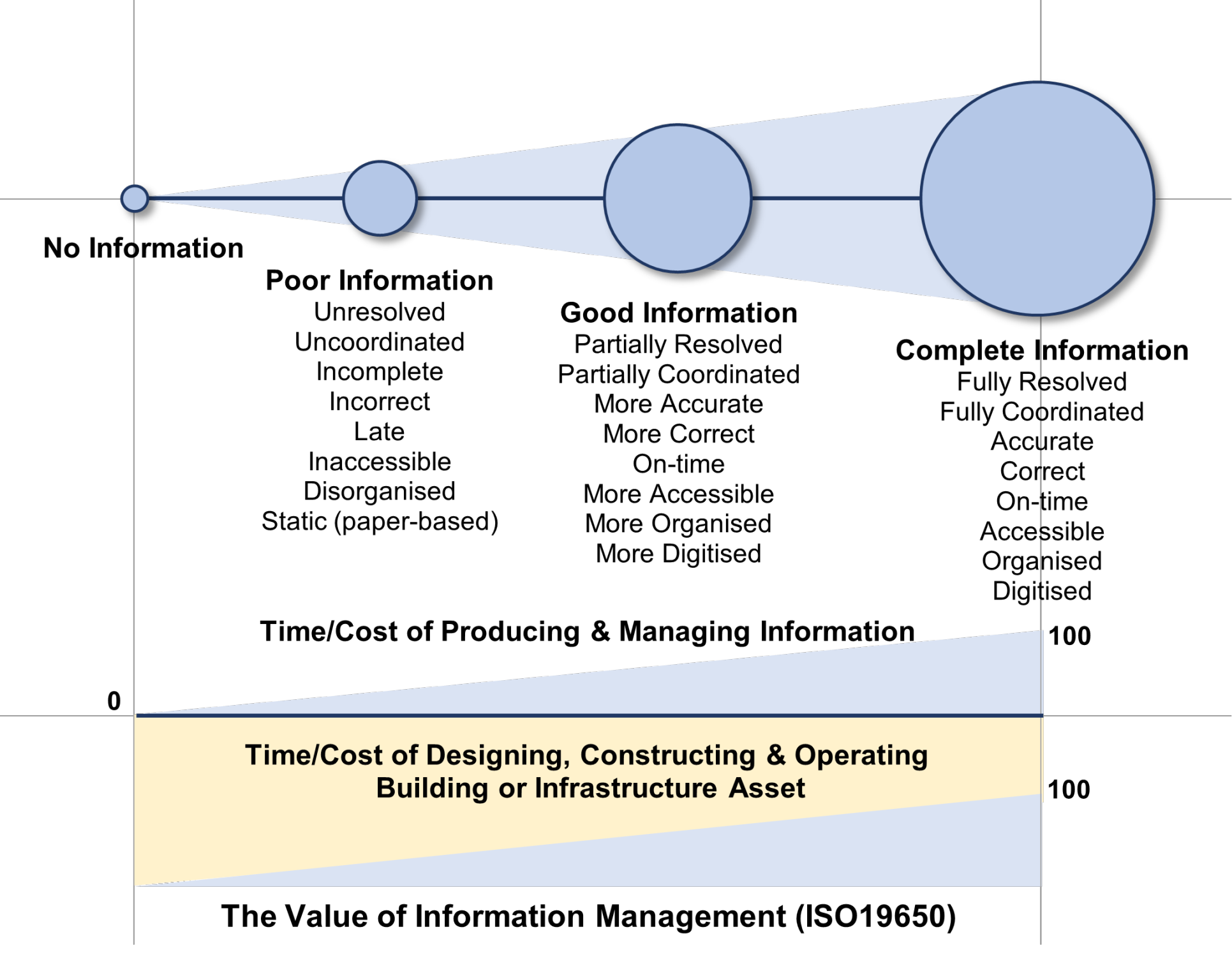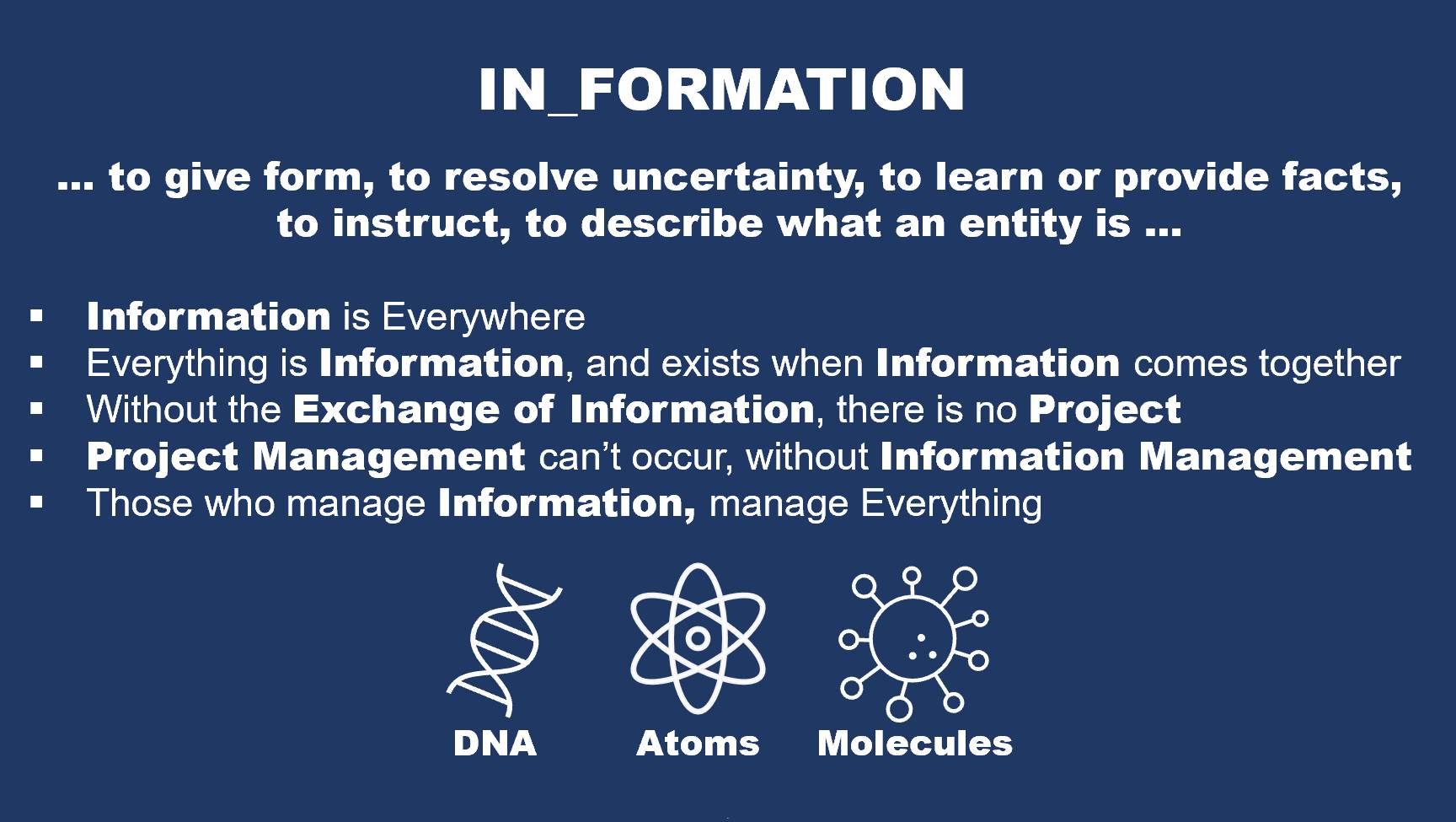Everybody “values”, or cares about, project outcomes and performance

But what’s the relationship between “information” and project outcomes or performance? Does the quality of “Information” impact project outcomes and performance? Is “information” important?
It is very little we can do without information. We can’t “communicate” design intent, statutory compliance, or instructions for the safe fabrication, assembly, and construction, without information. And, it will be very difficult to safely maintain and operate a building, or piece of infrastructure, without any information.
To carry out any task successfully, you need the right information available, at the right time, to instruct and communicate to the people carrying out the task, what is required, and of course, you need the people to understand the information and execute the task in accordance with the instructions.
What if the information is wrong, or late, or missing, or difficult to understand or process? Well the task will either be delayed, or executed incorrectly, or the people executing the task may make adjustments based on their own experience, to try and get the task complete anyway, to avoid delay, but the work may still be done incorrectly and there is a potential risk that it may have to be corrected again later. It may eventually get completed correctly, but there will be a cost and time impact, or you may have to accept the incorrect work.
So, clearly, there is some relationship between information, and project outcomes or performance. And, there is obviously a measure of “quality of information” that impacts project outcomes or performance in either a positive or negative way – good quality information that supports outcomes & performance, and poor quality information that detracts or hinders outcomes & performance.
Good quality information could be characterized and being correct, on time, available and clear, for the people executing the task, and poor quality information could be characterized as being incorrect, or late, unavailable, or unclear, for the people executing the task.

If “Quality of Information” impacts project outcomes or performance, then there is clearly a need to “Manage” the quality of information, the accuracy, timing, clarity, and understanding, in order to try to support positive project outcomes or performance. And therefore “Information Management” becomes a critical part of “Project Management” in delivering project outcomes or performance.
What exactly are we trying to “manage” on projects? The Scope (what we are supposed to build), Time (when we will complete the work), Cost (how much will it cost, and be worth, or what “value” are we creating), Quality (how will the building perform, how long will it last, how much will it cost to maintain and operate over its lifecycle), Risk (what could go wrong, and how to mitigate potential impact), Safety (keeping people alive and well), Environmental Impact (execute the project with minimal impact on the surroundings or the environment). None of these things are going to be effectively managed, without good quality information – information that is correct, on time, and clearly understood.
So, I think we can all agree, “information” is important. The “quality of information” is important (accurate, timing, availability, format, etc), and “information management” is critical to managing project outcomes and performance.
That brings us to the question “HOW?”. How should we “manage information”?
Well, believe it or not, there is “an instruction manual” that tells you exactly “how to do it” – an International, European and Irish standard for “organizing and digitizing information about buildings and civil engineering works” (ISO19650). An information management system, that supports a project management system (ISO21500), that supports an asset management system (ISO55000), and that supports an overall organizational or quality management system (ISO9001).
Really? So, what’s the problem? Well, the problem is that the construction industry, in general, doesn’t follow these standards. Everyone has their own way of doing things. It is all very well to have standards, but if nobody follows those standards, or there is no requirement, regulation, or legislation to enforce those standards, then they will have very little or no effect.
Since there is a clear relationship between “information management” and project outcomes or performance, and we want to have a positive impact on outcomes and performance, then let’s appreciate the “value” that good information brings, and start managing information in an organized and standardized way (ISO19650). The UK BIM Framework provides excellent guidance and resources for managing information using ISO19650

This article has taken from Autor: Ralph Montague BArch MRIAI, Director at ARCDOX
Napomena o autorskim pravima: Dozvoljeno preuzimanje sadržaja isključivo uz navođenje linka prema stranici našeg portala sa koje je sadržaj preuzet. Stavovi izraženi u ovom tekstu autorovi su i ne odražavaju nužno uredničku politiku The Balkantimes Press.
Copyright Notice: It is allowed to download the content only by providing a link to the page of our portal from which the content was downloaded. The views expressed in this text are those of the authors and do not necessarily reflect the editorial policies of The Balkantimes Press.
